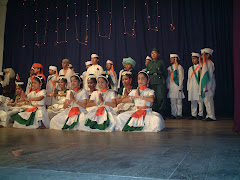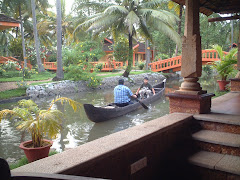WELCOME!
Mind is turbulent like wind but when held immobile through powerful concentration can unlock the secrets of the universe.
This is a rendezvous for contemplating about human existence, mysteries of the mind, and importance of wisdom in daily life. Perhaps when we look at the larger picture, when we are reminded of the true meaning of life, we can strive for a better world filled with understanding, mutual respect and peace.

Tuesday, July 29, 2008
Tough times
The suffering of ordinary people from the abominable bomb blasts is heartrending. I am so utterly saddened by this cruel act that I cannot even bring myself to respond to the speculations on the identity of the perpetrators. The need of the hour is to help the victims and render them support in rebuilding their lives. It is also equally important to prevent further atrocities. If reiterating that Muslims do not support this violence helps in doing that, I readily do so.
Thursday, July 24, 2008
A fine balance
As a law, exotic flowers do not bloom frequently. The two extremes of exquisite beauty and morbid ugliness exist in nature but do not manifest as often as the unremarkable but pleasing jasmine or lily. The ubiquitous jasmine makes up by its consistency and quality what it lacks in colorfulness. Though every flower has its place, it is the unimaginative jasmine that we seek for daily usage. Thus in nature, the mundane edges out the unfamiliar with its usefulness, relevance, reliability, and comforting flavor.
Religion like any facet of nature ranges from the sublime to the subversive. Some ideas uplift man, some hold man hostage by its heartless inflexibility. These opposing ideologies add to the diversity of human thought but again as in nature only the middle path can carry the majority. It is the straight path of faith, righteousness, kindness, love, honesty, responsibility, and duty. It lies at the heart of every human idea worth its salt. This is the essence of every religion that has ever existed.
The passionate construction of a clueless child will be washed away by the relentless sea. Without structure or order, a stable house cannot be built. On the other hand a dreary windowless edifice built with precision cannot house breathing, loving, vibrant people whose spirit will be killed by its macabre rigidity. A feeling of largesse, abundant light, fresh air-these timeless factors-contribute to the making of a good house.
If this is the case with building a home, how much more important are subtle eternal qualities of freedom and love when fashioning a human being? Rituals, rules, duties, and responsibilities are essential cornerstones but without love, kindness, friendship, and honesty to enrich them, man will suffocate and languish in a prison of his own making. The converse is also perfectly true. Good intention executed without proper guidelines or a definite purpose is akin to an elegant catamaran decked wi th flowers adrift at sea.
th flowers adrift at sea.
How can we attain this fine balance? Where will we draw the line? What criteria will define right and wrong? For a believer, religion provides these answers effectively. Within each religion, apart from the universal message of belief and righteousness that is common to every religion, there are laws that are specific to a time, place, and people. In the course of human evolution, revelations have addressed unique needs as well as eternal ones. (When exclusive solutions are stretched into sweeping generalizations, they wear thin. This is the cause for all religious conflicts.)
Now what about the atheist? Is individual human thought capable of making an adequate delineation? Will human laws be sufficient to tackle the intricacies of the human mind? Will it rein in his baser instincts, inspire noble thoughts? After all, the finest of thoughts have all emanated from religious personalities. Can the atheist shun them all? Or will he accept them but not the origin?
I recently read that the dinosaurs were wiped out at the exact moment of their evolutionary surge. If we accept the idea of chance to explain the existence of the universe, how come the right choice always is made at the right instance with such exacting accuracy every single time in nature? What explains the complexities and the intrigues? Why did so many wise men insist on the same wisdom over the span of centuries and millennia spread all over the globe? Just a human tendency to believe in something bigger than him? An elaborate hoax? Or an eternal truth which sagacious men at varying times have by divine munificence discovered again and again and tried compassionately to simplify in order to convey it to the masses? What seems more probable? You tell me.
Religion like any facet of nature ranges from the sublime to the subversive. Some ideas uplift man, some hold man hostage by its heartless inflexibility. These opposing ideologies add to the diversity of human thought but again as in nature only the middle path can carry the majority. It is the straight path of faith, righteousness, kindness, love, honesty, responsibility, and duty. It lies at the heart of every human idea worth its salt. This is the essence of every religion that has ever existed.
The passionate construction of a clueless child will be washed away by the relentless sea. Without structure or order, a stable house cannot be built. On the other hand a dreary windowless edifice built with precision cannot house breathing, loving, vibrant people whose spirit will be killed by its macabre rigidity. A feeling of largesse, abundant light, fresh air-these timeless factors-contribute to the making of a good house.
If this is the case with building a home, how much more important are subtle eternal qualities of freedom and love when fashioning a human being? Rituals, rules, duties, and responsibilities are essential cornerstones but without love, kindness, friendship, and honesty to enrich them, man will suffocate and languish in a prison of his own making. The converse is also perfectly true. Good intention executed without proper guidelines or a definite purpose is akin to an elegant catamaran decked wi
 th flowers adrift at sea.
th flowers adrift at sea.How can we attain this fine balance? Where will we draw the line? What criteria will define right and wrong? For a believer, religion provides these answers effectively. Within each religion, apart from the universal message of belief and righteousness that is common to every religion, there are laws that are specific to a time, place, and people. In the course of human evolution, revelations have addressed unique needs as well as eternal ones. (When exclusive solutions are stretched into sweeping generalizations, they wear thin. This is the cause for all religious conflicts.)
Now what about the atheist? Is individual human thought capable of making an adequate delineation? Will human laws be sufficient to tackle the intricacies of the human mind? Will it rein in his baser instincts, inspire noble thoughts? After all, the finest of thoughts have all emanated from religious personalities. Can the atheist shun them all? Or will he accept them but not the origin?
I recently read that the dinosaurs were wiped out at the exact moment of their evolutionary surge. If we accept the idea of chance to explain the existence of the universe, how come the right choice always is made at the right instance with such exacting accuracy every single time in nature? What explains the complexities and the intrigues? Why did so many wise men insist on the same wisdom over the span of centuries and millennia spread all over the globe? Just a human tendency to believe in something bigger than him? An elaborate hoax? Or an eternal truth which sagacious men at varying times have by divine munificence discovered again and again and tried compassionately to simplify in order to convey it to the masses? What seems more probable? You tell me.
Thursday, July 17, 2008
When fish do not fly
An important part of life is to know when to leave people alone. Sometimes things are best left undisturbed. For example an encroachment into the lives of endangered tribes brings in its wake death and destruction to them as they lack the immunity to survive the diseases that accompany it. There are nomadic tribes who are not accustomed to a roof over their head. Providing them with modern housing and schooling might seem a rational solution but such a drastic departure from their set norms will spell disaster for them. Thus what is perfectly normal for one person might prove the nemesis for another. (The US is realizing this as its attempt to stuff democracy down Iraq’s throat backfires.) This lack of uniformity in nature is what makes the world so special.
Our individual lives are a microcosm of the larger contradictions that pervade the material universe. People often build perfectly blissful relationships unaware of the idiosyncrasies of their partners or precariousness of some situation. For an outsider this might seem like a fool’s paradise and could lead to a great temptation to interfere and inform but such a seemingly wise step will upset the fragile balance that preserves the harmony of that unique union. The earlier we realize that our ideas of happiness need not meet that of others, the sooner will we stop committing mischief.
Every person faces predicaments in life. On closer examination, we will realize that the severity of one person’s trouble is directly proportional to the capacity of that person to solve it. As people are unique, so will also be the problems that they have to endure. Another interesting factor in life is that even if more difficulties lurk beneath the more obvious ones, most people do not identify these until they have become capable of resolving them. This is a defense mechanism that protects them. Intruding into their lives and explaining to them the extent of the problems that surround them before they have the ability to tackle them would thus be a form of cruelty.
Any meaningful transformation requires patience and opportunity. Only self-driven changes endure. Indigenous solutions can delve into depths that extraneous ones cannot fathom. Forced remedies shock, impede, and finally wither away. Evolution is an essential component of life but only when time is right will things fall into place.

Our individual lives are a microcosm of the larger contradictions that pervade the material universe. People often build perfectly blissful relationships unaware of the idiosyncrasies of their partners or precariousness of some situation. For an outsider this might seem like a fool’s paradise and could lead to a great temptation to interfere and inform but such a seemingly wise step will upset the fragile balance that preserves the harmony of that unique union. The earlier we realize that our ideas of happiness need not meet that of others, the sooner will we stop committing mischief.
Every person faces predicaments in life. On closer examination, we will realize that the severity of one person’s trouble is directly proportional to the capacity of that person to solve it. As people are unique, so will also be the problems that they have to endure. Another interesting factor in life is that even if more difficulties lurk beneath the more obvious ones, most people do not identify these until they have become capable of resolving them. This is a defense mechanism that protects them. Intruding into their lives and explaining to them the extent of the problems that surround them before they have the ability to tackle them would thus be a form of cruelty.
Any meaningful transformation requires patience and opportunity. Only self-driven changes endure. Indigenous solutions can delve into depths that extraneous ones cannot fathom. Forced remedies shock, impede, and finally wither away. Evolution is an essential component of life but only when time is right will things fall into place.

Thursday, July 10, 2008
The story of the three vases
Once upon a time, there were three extraordinarily beautiful vases with equally exquisite lids. They were immaculate. Having fashioned them out of one of the best moulds, their maker entrusted them with the responsibility of collecting potable rainwater. He also reminded them to call him if they needed help. 
Vase #2 on the other hand could not resist any content. He imbibed dust and dirt, rolled down a step or two and even broke his lid. When it rained, the water that was collected took on a brackish hue. He was very much troubled by the impurity of the water and complained constantly about the fetid rain.
Vase #3 was very humble. He tried as best as he could to keep himself neat. He remembered his maker’s words and asked for his help to remove the lid. To his astonishment, he found that it was raining all the time and how pristine the water was! Finally the sun came up and having fulfilled his duties, the vase shone with contentment and was a source of joy to all who came up to him to satisfy their thirst.
Some people like vase #1 are righteous and rigid, approaching religion with a ritualistic fervor but they never surrender to God wholeheartedly because of their pride or ego. They consider themselves self-sufficient. They remain blind to their deficiencies and instead of asking for the Almighty’s help to remove the lid that veils his grace, they lose heart and never find the joy of life. Thus as grace flows freely like the ever-pouring rain all around them, their resistance to surrender makes them unsuitable to receive it.
Another group of people like vase #2 indulges themselves freely in every desire. They pollute everything they touch and even the best of gifts will for them become a horrible burden. They go through life cribbing about the unfairness of life and will never perceive that their own unhealthy views alone distort the unflawed landscape.
A few are like vase #3, the grateful ones who submit to the will of God. They are aware of their faults and strive incessantly to purify themselves but they also know that God alone with his abundant grace can bring about true transformation. With humility and devotion they serve and obey God. They have joy in all that they do having been blessed with true vision and becoming a fount of ecstasy to all that come to them.
The question is which vase would you like to be?

Vase #1 staved off mud and grime keeping himself clean. He waited patiently for the day the rains would come but secretly he was convinced that he would not be fit for such a noble task as collecting water. He was always cautious and fearful but being proud never asked for any help. However, he was unable to collect any water. Soon he even started to wonder whether his maker had lied to him and if such an entity as rain ever existed.
Vase #2 on the other hand could not resist any content. He imbibed dust and dirt, rolled down a step or two and even broke his lid. When it rained, the water that was collected took on a brackish hue. He was very much troubled by the impurity of the water and complained constantly about the fetid rain.
Vase #3 was very humble. He tried as best as he could to keep himself neat. He remembered his maker’s words and asked for his help to remove the lid. To his astonishment, he found that it was raining all the time and how pristine the water was! Finally the sun came up and having fulfilled his duties, the vase shone with contentment and was a source of joy to all who came up to him to satisfy their thirst.

Thus ends the story of the three vases. All of us go through life hoping for peace and happiness like the elusive rainwater that the vases yearned for.
Some people like vase #1 are righteous and rigid, approaching religion with a ritualistic fervor but they never surrender to God wholeheartedly because of their pride or ego. They consider themselves self-sufficient. They remain blind to their deficiencies and instead of asking for the Almighty’s help to remove the lid that veils his grace, they lose heart and never find the joy of life. Thus as grace flows freely like the ever-pouring rain all around them, their resistance to surrender makes them unsuitable to receive it.
Another group of people like vase #2 indulges themselves freely in every desire. They pollute everything they touch and even the best of gifts will for them become a horrible burden. They go through life cribbing about the unfairness of life and will never perceive that their own unhealthy views alone distort the unflawed landscape.
A few are like vase #3, the grateful ones who submit to the will of God. They are aware of their faults and strive incessantly to purify themselves but they also know that God alone with his abundant grace can bring about true transformation. With humility and devotion they serve and obey God. They have joy in all that they do having been blessed with true vision and becoming a fount of ecstasy to all that come to them.
The question is which vase would you like to be?
Friday, July 4, 2008
The importance of extracurricular reading
Books have always served as a second parent to me, offering an escape into its fantasies, revealing a world that distracts, instructs, and enthralls. In silent moments wrapped in the warmth of words, I have discovered love, kindness, and wisdom beyond the realm of daily existence. Without moving an inch, I have been swept away to faraway lands and mingled with creatures both real and imaginary. With the passage of time, the passion for books has only grown stronger and it enchants me to drink from its eclectic, sometimes even esoteric fount. Thus it is my deep desire that the simple pleasures of reading is made available to everyone.
Hence it saddens me deeply to note that the current system of education in India does not succeed in inculcating a healthy appetite for books in children. Of course, the advent of TV, video, and computer games has ensnared the attention of children but I still feel that if there is an honest effort at school to plant the seed of reading, monitor its progress, and emphasize its importance in the form of grades and other incentives, a lifesaving skill can be fostered. Parental nudging alone, from my own experience, does not bear fruit as children already weighed down by the extensive syllabus and its nuances tend to view all books with trepidation. Therefore, it is absolutely essential that schools find a competitive way to work it into the curriculum in the form of book reports or other innovative methods so that adequate time is available to our kids to pursue the joy of reading books of their own choice.
Hence it saddens me deeply to note that the current system of education in India does not succeed in inculcating a healthy appetite for books in children. Of course, the advent of TV, video, and computer games has ensnared the attention of children but I still feel that if there is an honest effort at school to plant the seed of reading, monitor its progress, and emphasize its importance in the form of grades and other incentives, a lifesaving skill can be fostered. Parental nudging alone, from my own experience, does not bear fruit as children already weighed down by the extensive syllabus and its nuances tend to view all books with trepidation. Therefore, it is absolutely essential that schools find a competitive way to work it into the curriculum in the form of book reports or other innovative methods so that adequate time is available to our kids to pursue the joy of reading books of their own choice.
Subscribe to:
Comments (Atom)

Please do not hesitate to leave your valuable comments.
I look forward to reading your thoughts and gaining new ideas.




